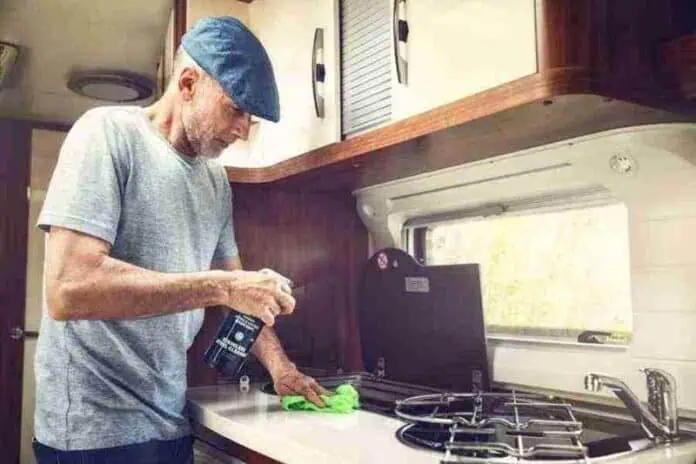Traveling by RV offers a sense of freedom like no other. You get to explore different places, meet new people, and experience diverse cultures. However, one aspect that often gets overlooked in this exciting journey is cooking. Preparing meals on the road can be challenging, especially for those new to the RV lifestyle. However, with the right tips and tricks, you can turn your RV kitchen into a space for culinary creativity. In this comprehensive guide, we’ll explore ten essential tips for RV cooking made easy that will make your life tastier and more fun.
Introduction

Explanation of the growing popularity of RV cooking
RV cooking has surged in popularity over the past few years. This growth is largely due to an increasing number of people embracing the nomadic lifestyle, either full-time or as vacationers. The pandemic has also played a significant role, with people seeking safer travel options that allow them to control their environments. Cooking in an RV allows travelers to maintain a healthy diet, save money, and enjoy home-cooked meals, no matter where they are.
Overview of the benefits of cooking in an RV

Cooking in an RV kitchen has numerous advantages. It’s an opportunity to bond with your travel companions over delicious meals. It provides a sense of familiarity and comfort when you’re far from home. More importantly, it gives you control over what you eat, which is crucial for those with dietary restrictions or those trying to maintain a healthy diet. Additionally, it’s a chance to experiment with local ingredients and cuisines, enriching your travel experience and allowing you to truly immerse yourself in the culture of the places you visit.
1. Plan Ahead: Before hitting the road, plan your meals for the duration of your trip. This will help you create a shopping list and ensure you have all the necessary ingredients on hand.
2. Optimize Storage Space: RV kitchens are typically small and have limited storage space. Invest in stackable containers, collapsible bowls, and other space-saving kitchen tools to maximize your storage options.
3. Use Multi-Purpose Appliances: Instead of bringing multiple appliances, opt for multi-purpose ones. For example, a slow cooker can be used for soups, stews, and even baking.
4. Embrace One-Pot Meals: One-pot meals are a lifesaver when cooking in an RV. They require minimal cleanup and can be cooked on a stovetop or in a slow cooker.
5. Pre-Cook and Freeze Meals: Pre-cooking and freezing meals before your trip can save you time and effort on the road. Simply thaw and reheat when you’re ready to eat.
6. Stock up on non-perishable foods: Non-perishable foods like canned beans, pasta, rice, and spices are essential for RV cooking and are easy to prepare. They have a long shelf life and can be used in a variety of dishes.
7. Make Use of Local Ingredients: When exploring new places, take advantage of local ingredients and flavors. Visit farmers’ markets or roadside stands to find fresh produce and unique ingredients.
8. Invest in Kitchen Gadgets: While space is limited, investing in a few key kitchen gadgets can make a big difference. Consider getting a pressure cooker, blender, or mini oven to expand your cooking options.
9. Keep it Simple: RV cooking is all about simplicity. Focus on easy-to-make dishes that require minimal ingredients and preparation. Don’t be afraid to rely on pre-packaged items like marinades or sauces to save time.
10. Clean as You Go: RV kitchens can get messy quickly, so it’s important to clean as you go. This will save you time and ensure a clean and organized space for future meals.
Conclusion: RV cooking may seem daunting at first, but with these essential tips in mind, you’ll be well-equipped to handle any culinary adventure on the road.
From planning and organizing to embracing local flavours and keeping it simple, you’ll discover that cooking in your RV can be a fun and rewarding experience.
Tip #1: Plan Your Meals in Advance

Importance of meal planning for RV cooking
Meal planning is a game-changer when it comes to RV cooking. It saves you time, reduces stress, and avoids the last-minute scramble for ingredients. A well-planned meal plan ensures that you have all the necessary ingredients on hand and helps prevent food wastage.
Tips for effectively planning meals on the road
To plan your meals effectively, start by considering the length of your trip and the storage space available. Make a list of meals that are easy to prepare, versatile, and can be made with readily available ingredients. Consider meals that can be prepared in advance and frozen, such as stews or casseroles. Don’t forget to account for snacks, drinks, and desserts. Lastly, always have a few backup meals in case of unexpected situations.
Tip #2: Stock Up on Essential Ingredients

Importance of having essential ingredients on hand in an RV kitchen
Having essential ingredients in your RV kitchen is crucial. It allows you to whip up a meal even when you’re miles away from the nearest grocery store. It also minimizes the need for frequent shopping trips, saving you time and energy that can be better spent exploring your surroundings.
List of must-have ingredients for cooking in an RV
When stocking your RV kitchen, focus on versatile and non-perishable items. Some must-haves include canned goods (beans, vegetables, fruits, and fish), dry pasta and rice, cooking oils, spices, instant noodles, and soup mixes. Fresh produce with a longer shelf life, such as potatoes, onions, and apples, is also good to have. And don’t forget about quick snacks like granola bars, trail mix, and popcorn.
Tip #3: Use Space-Saving Cooking Tools

Importance of using space-saving cooking tools in an RV kitchen
Space is a valuable commodity in an RV, and it extends to the kitchen as well. Using space-saving cooking tools not only makes your kitchen less cluttered but also improves efficiency when preparing meals.
Recommendations for compact and multi-purpose cooking tools
Choose cooking tools that serve multiple purposes. A pressure cooker, for instance, can be used for boiling, steaming, and slow-cooking. A nesting cookware set saves storage space while providing multiple cooking options. Collapsible items like measuring cups, colanders, and mixing bowls are also great. Other essentials include a compact cutting board, a multi-tool knife, and stackable storage containers.
Tip #4: Optimize Storage Space

Importance of maximizing storage space in an RV kitchen
Maximizing storage space in your RV kitchen can make a significant difference in your cooking experience. With limited space, every inch counts. Proper organization not only creates more room but also makes it easier to find what you need when cooking.
Strategies for organizing and utilizing limited storage space
Use vertical space by installing shelves or hanging racks. Utilize the inside of cabinet doors for additional storage with hooks or magnetic strips. Consider using drawer dividers for utensils and cutlery. Store items in clear, stackable containers to easily see what’s inside. Lastly, regularly declutter and remove items that you don’t use frequently.
Tip #5: Embrace One-Pot and One-Pan Meals

Importance of easy and efficient cooking methods in an RV kitchen
In an RV kitchen, simplicity is key. One-pot and one-pan meals are not only easy to prepare but also minimize cleanup. Plus, they often require less energy consumption, an important consideration when running on limited power resources.
Recipes and tips for delicious one-pot and one-pan meals
There are countless one-pot and one-pan recipes that you can try. Some favorites include chili, spaghetti, stir-fry, and frittatas. When preparing these meals, start with the ingredient that takes the longest to cook, then gradually add the rest. Don’t be afraid to experiment with different flavors and ingredients based on what’s available. The key is to keep it simple and flavorful.
Tip #6: Make Use of Outdoor Cooking Options

Importance of outdoor cooking options for RV enthusiasts
Outdoor cooking is a beloved part of the RV lifestyle. It allows you to enjoy nature while preparing your meals, making your culinary experience even more enjoyable. Moreover, it’s a great way to socialize with fellow campers and share food and stories.
Ideas and suggestions for cooking meals outside the RV
Grilling is the most popular form of outdoor cooking, perfect for burgers, steaks, veggies, and more. Campfires also offer unique cooking options; think s’mores, hot dogs, or foil-wrapped potatoes. A portable camping stove can be useful for more complex meals. Remember to always follow campground rules and safety guidelines when cooking outdoors.
Tip #7: Keep It Simple and Minimize Cleanup

Importance of simplicity and easy cleanup in RV cooking
Simplicity is the cornerstone of cooking in an RV. Keeping your meals simple reduces preparation time, uses fewer resources, and makes cleanup a breeze. After all, who wants to spend their precious travel time washing dishes?
Tips for simplifying recipes and minimizing dishwashing
To simplify your recipes, choose those with fewer ingredients and steps. Use pre-prepared ingredients when possible, like pre-cut vegetables or canned beans. As for cleanup, one-pot meals are your best friend. Also, consider using eco-friendly disposable plates and utensils for those days when you just don’t feel like doing dishes. Remember, the less time you spend in the kitchen, the more time you have for adventures.
Tip #8: Plan for Limited Water Supply

Importance of conserving water in an RV kitchen
Water conservation is vital when living in an RV. This applies to cooking as well. By planning your meals and cooking methods carefully, you can significantly reduce your water usage, leaving more for other essential needs.
Strategies for cooking with a limited water supply
When cooking with a limited water supply, choose recipes that require less water. Steaming and grilling are excellent cooking methods that use minimal water. Rinse your fruits and vegetables in a bowl instead of under running water. Reuse cooking water for tasks like washing dishes or soaking other foods. Every drop counts, so be mindful of your water usage whenever you’re in the RV kitchen.
Tip #9: Explore Local Cuisine on the Road

Importance of experiencing local flavors while traveling in an RV
Traveling in an RV gives you a unique opportunity to explore local cuisines. It’s not just about eating; it’s about immersing yourself in the culture of the places you visit. Plus, trying local foods can inspire you to recreate the dishes in your RV kitchen.
Suggestions for finding and trying regional dishes
Visit local farmer’s markets or grocery stores to find fresh, local produce. Try out local restaurants and food trucks. Attend food festivals or cooking classes if they’re available. Don’t be afraid to ask locals for recommendations. Exploring local cuisine is part of the adventure, so be open-minded and enjoy the experience.
Tip #10: Enjoy the Journey and Experiment

Importance of embracing the adventure of RV cooking
At its core, RV cooking is about embracing the journey. Every meal you prepare is part of the adventure. So don’t stress too much about getting everything perfect. Instead, focus on the joy of creating meals in different locations, with different ingredients, and under different circumstances.
Encouragement to try new recipes and techniques while on the road
Find RV cooking tips to try new recipes. Experiment with different cooking methods. Swap ingredients based on what’s available locally. Improvise when necessary. Make mistakes and learn from them. Above all, have fun. After all, isn’t that what traveling in an RV is all about?
With proper planning and the right mindset, it can become one of the most enjoyable aspects of your RV lifestyle.
Conclusion
Summary of the 10 essentials for RV cooking for effortless culinary adventures on the road
In conclusion, cooking in an RV doesn’t have to be daunting. Remember to plan your meals, stock up on essential ingredients, make good use of your space, and embrace simplicity. Don’t forget to conserve water, try local cuisines, and most importantly, enjoy the journey. With these ten tips, you’re well on your way to an effortless culinary adventure on the road. Following these tips can make your RV cooking experience enjoyable, flavorful, and hassle-free. Happy cooking and happy travels!

















